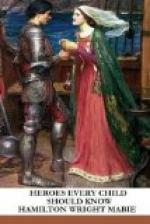“At the time I speak of he stood in profound silence and had the statue-like air which mental greatness alone can bestow. As he turned to enter the building, and was ascending the staircase to the Congressional hall, I glided along unseen, almost under the cover of the skirts of his dress, and entered into the lobby of the House which was in session to receive him.
“At Washington’s entrance there was a most profound silence. House, lobbies, gallery, all were wrapped in deepest attention. And the souls of the entire assemblage seemed peering from their eyes as the noble figure deliberately and unaffectedly advanced up the broad aisle of the hall between ranks of standing senators and members, and slowly ascended the steps leading to the speaker’s chair.
“The President having seated himself remained in silence, and the members took their seats, waiting for the speech. No house of worship was ever more profoundly still than that large and crowded chamber.
“Washington was dressed precisely as Stuart has painted him in full-length portrait—in a full suit of the richest black velvet, with diamond knee-buckles and square silver buckles set upon shoes japanned with most scrupulous neatness; black silk stockings, his shirt ruffled at the breast and waist, a light dress sword, his hair profusely powdered, fully dressed, so as to project at the sides, and gathered behind in a silk bag ornamented with a large rose of black ribbon. He held his cocked hat, which had a large black cockade on one side of it, in his hand, as he advanced toward the chair, and when seated, laid it on the table.
“At length thrusting his hand within the side of his coat, he drew forth a roll of manuscript which he opened, and rising read in a rich, deep, full, sonorous voice his opening address to Congress. His enunciation was deliberate, justly emphasised, very distinct, and accompanied with an air of deep solemnity as being the utterance of a mind conscious of the whole responsibility of its position, but not oppressed by it. There was ever about the man something which impressed one with the conviction that he was exactly and fully equal to what he had to do. He was never hurried; never negligent; but seemed ever prepared for the occasion, be it what it might. In his study, in his parlour, at a levee, before Congress, at the head of the army, he seemed ever to be just what the situation required. He possessed, in a degree never equalled by any human being I ever saw, the strongest, most ever-present sense of propriety.”
In the early part of Washington’s administration, great complaints were made by political opponents of the aristocratic and royal demeanour of the President. Particularly, these complaints were about the manner of his receiving visitors. In a letter Washington gave account of the origin of his levees: “Before the custom was established,” he wrote, “which now accommodates foreign characters, strangers and




